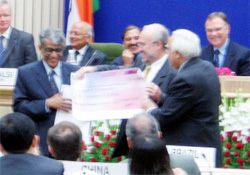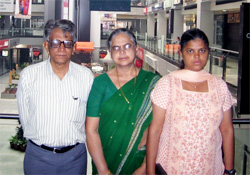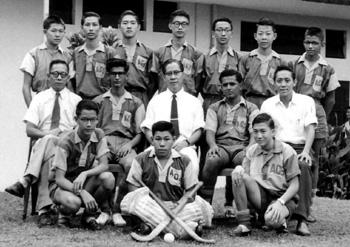|
Echo: Did you gain
anything from ACS?
Joe: Yes indeed. I really enjoyed my stint in ACS, albeit
short. The school, the teachers and friends I made all played a
part in shaping my life, sparked my interest in matters scientific
and led me to the path my life has taken. The qualities I
imbibed like self-belief, true discipline and the knowledge that
friendships transcend all racial, spiritual and cultural barriers
were priceless. Among the many good friends I made was a
gangster whom I will always remember for the kindness and
affection he showed me. The teachers too were wonderful.
Echo: Yes, what about the teachers?
Joe: I remember the many conversations I had with Mr
Peter Lim which led me to be a Methodist, much to the chagrin
of my parents who were staunch Anglicans. I remember Mr Lee Hah
Ing well for teaching me hockey strategy. He was way ahead of
his time in applying football-style passing to hockey. That's what
all international hockey teams are doing now! And of course, who
can forget Mr Earnest Lau, then one of the more youthful
teachers whom I could relate to. I have often re-read “The Happy
Return” by C. S. Forester, which Mr Lau brought vividly to life in
Form 4.
|
|
 |
|
Joe
receiving the Vilho Väisälä Award |

|
Joe
with his wife Sudha and
daughter Priya
|
|
|
Echo: Were there any
memorable moments for you in ACS?
Joe: Yes … being caught and punished by Mr Chee Keng Lim
for sliding down the embankment outside the Form 5B classroom!
I think I had the distinction
of being the oldest tenderfoot in the 11th Scout Troop. Mr Ong
Kang Hai virtually gave up on me! I was also a late starter
where swimming is concern. On one camping trip, I ventured on a
raft together with some of the other scouts. Being a non-swimmer,
I was placed in the middle where I sat comfortably reading a book
until suddenly, someone shouted “Jelly fish, jelly fish”! Before I
could collect my wits, I found myself in the sea bobbing up and
down (more down than up!) for dear life. Fortunately, Lee Ping
Wen, who was calm as ever, grabbed hold of me and saved my
life. On reflection, he need not have wasted the effort as I was
very sure that I would have grabbed him if he had not grabbed me
first. He refuses to admit that he saved my life - probably trying
to dodge the merciless pillorying that awaits him for making such
a mistake!

Besides Cricket, Joe (back row, extreme
right) was also
a member of the school's Hockey first team.
Echo: Tell us what you did after you left ACS.
Joe: After completing Form 6 at ACS, I continued with my
tertiary education in India where I obtained a B. Tech (Electrical
Engineering) degree at the Indian Institute of Technology at
Kharagpur. I then received a scholarship to Bradley University,
Peoria, Illinois, USA, and went on to do my Ph.D at the University
of Illinois. Although I was nominally in the Electrical
Engineering Department, I took most of my course work in Physics,
and carried out research in Submillimetre Wave Lasers and Gas
Discharge Physics.
When I returned to India in
1972, I could not get a job right away, and so spent two years on
a sort of dole from the Government while carrying out research at
the National Aeronautical (later Aerospace) Labs in Bangalore. I
retired in 2002 from NAL, and worked on contract until January
2005. I’m now teaching in an Engineering College.
During my tenure at NAL, I
founded and headed a group that worked on meteorological
instrumentation for airports that led to the development of the
AVRA. I have also developed models for optical pulse propagation
through dense scattering media-of relevance to laser ranging and
targeting.
Echo: Finally, Joe … what advice would you give to our
young readers if they are thinking of pursuing a career in
aeronautics.
Joe: Aeronautics is a multi-faceted discipline that
involves work in areas as diverse as fluid mechanics, structures,
polymers, optics, electronics, etc .. the list goes on. For a
career in this field, you need a good grasp of the fundamentals
(mathematics, physics and chemistry) which will arm you for all
eventualities at the university level.
My advice is to ‘be prepared’
and plan your career path carefully, study hard, and yes … have
fun doing all these things! A good example is my fellow
schoolmate, Bill Tan, whom I consider is the most complete
engineer-scientist that I know. In school, he was very focused on
what he wanted to be and went about preparing himself for his
future accordingly. He improvised and built a wind-tunnel while
still in school, which was quite a feat considering that was fifty
years ago, and his interests later led him to be the originator of
a proposal to produce muonic fusion at enhanced density (article
in Nature 1976). He is a living example of how to set about a
career---build something with your hands, study hard, play hard,
and enjoy doing all these things.
Last but not least, always remember that “The Best is Yet to Be!"
|